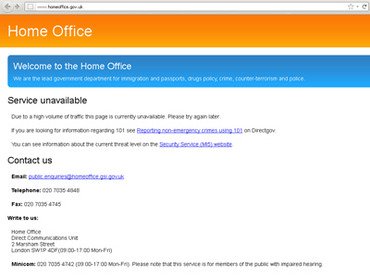Anonymous hacking group is alleged to have disrupted access to the UK Home Office website after an apparent cyber attack in protest against government surveillance plans.
A message on the Home Office website said the page was currently unavailable “due to a high volume of traffic”, suggesting a denial of service attack had been perpetrated.
A message on Twitter claiming to be from Anonymous, a loosely organized group of hackers who promote access to free speech, information and transparency, said the action was “for [the Home Office’s] draconian surveillance proposals”.
However, another message claimed it was over extradition rules from the UK to the U.S.
One tweet claiming to be from Anonymous said: “You should not give UK citizens to foreign countries without evidence. If an offence happened in the UK, so should the trial.”
A Home Office spokesman said: “We are aware of some reports that the Home Office website may be the subject of an online protest. We have put all potential measures in place and will be monitoring the situation very closely.”

The Home Office added that if a successful denial of service attempt did occur, it would “liaise with the technical team and update as necessary”.
A denial of service attack prevents a website from functioning properly, sometimes by swamping it with more traffic than it can handle. Such an action was believed to have been responsible for crashing the Home Office site.
The apparent attack came after it emerged last week that the British government was planning a massive expansion of its powers to monitor the email exchanges and website visits of every person in the UK.
Under legislation expected in next month’s Queen’s Speech, internet companies will be instructed to install hardware enabling GCHQ – the government’s electronic “listening” agency – to examine “on demand” any phone call made, text message and email sent, and website accessed, in “real time” without a warrant.
Ministers have faced a backlash over the plans, with senior MPs from both coalition parties, as well as civil liberties groups, lining up to denounce it.
Just days ago China felt the effects of Anonymous after the hacking group claimed it had brought down several government websites in a protest against the country’s internet restrictions.
The sites included government bureaus in several Chinese cities, including Chengdu, a provincial capital in southwest China.
In a message left on one of the sites the hackers said they did not agree with blocking information from the public.
Part of it read in English: “Dear Chinese government, you are in infallible, today websites are hacked, tomorrow it will be your vile regime that will fall.”
Included in the message were instructions for Chinese people on how to get around the restrictions imposed by their government.
Chinese officials block citizens from seeing social media sites such as Facebook, Twitter and information on politically sensitive topics.
